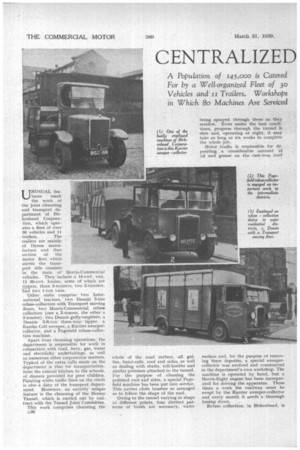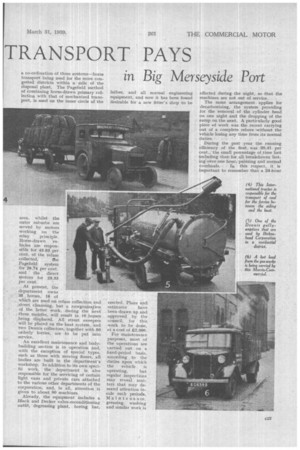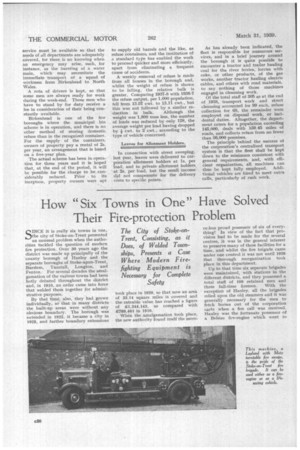CENTRALIZED TRANSPORT PAYS
Page 90

Page 91

Page 92

If you've noticed an error in this article please click here to report it so we can fix it.
in Big Merseyside Port
A Population of 145,000 is Catered For by a Well-organized Fleet of 3o Vehicles and xi Trailers. Workshops in Which So Machines Are Serviced UNUSUAL features mark the work of the joint cleansing and transport department of Birkenhead Corporation, which operates a fleet of over 30 vehicles and 11
trailers. The trailers are mainly of Dyson. manufacture and that section of the motor fleet which series the transport side consists in the main of • Morris-Commercial vehicles, They include a 15-cwt. van, 11 30-cwt. lorries, some of which are tippers, three 3-tonners, two 2-tonners, and two 1-ton vans.
Other units comprise two International tractors, two Dennis 3-ton refuse-collectors with Transport moving floors,. two Morris-Commercial refuse collectors (one a 2-tonner, the other a 3-tonner) , two Dennis gully-emptiers, a Dennis 5-6-ton three-way tipper, a Karrier Colt sweeper, a Karrier sweepercollector, and a Pagefield refuse-collection machine.
Apart from cleansing operations, the department is responsible for work in connection with road, ferry, gas, water and electricity undertakings, as well as numerous other corporation matters. Typical of the extra calls made on the department is that for transportation, from the central kitchen to the schools, of dinners provided for poor children. Painting white traffic lines on the roads is also a duty of the transport department. Moreover, an entirely unique feature is the cleansing of the Mersey Tunnel, which is carried out by contract with the Tunnel Joint Committee.
This work comprises 'cleansing the c86 whole of the road surface, all gullies, hand-rails, roof and sides, as well as dealing with shafts, toll-booths and similar premises attached to the tunnel. For the purpose of cleaning the polished roof and sides, a special Pagefield machine has been put into service. This carries cloth brushes so arranged as to follow the shape of the roof.
Owing to the tunnel varying in shape at different points, four distinct ,patterns of brush are necessary, water being sprayed through them as they revolve. Even under the best conditions, progress through the tunnel is slow and, operating at night, it may take as long as six weeks to complete the whole job.
Motor traffic is responsible for depositing a considerable amount of oil and grease on the cast-iron road
surface and, for the purpose of removing these deposits, a special sweepercollector was evolved and constructed in the department's own workshop. The machine is operated by hand, but a Morris-Eight engine has been incorporated for driving the apparatus. Three times a week the roadway must be swept by the Karrier sweeper-collector and every month it needs a thorough hosing down.
Refuse collection, in Birkenhead, is a co-ordination of three systems—horse transport being used for the more congested districts within a mile of the disposal plant. The Pagefield method of combining horse-drawn primary collection with that of mechanized transport, is used on the inner circle of the area, whilst the outer suburbs are served by motors working on the relay principle. Horse-drawn vehicles are responsible for 43.93 per cent, of the refuse collected, the Pagefield system for 26274 per cent. and the direct motors for 29.33 per cent.
At present, the department owns 35 horses, 18 of which are used on refuse collection and street. cleansing, but a reorganization of the latter work, during the next three months, will result in 10 horses being displaced. All street sweepers will be placed on the beat _system, and two Dennis collectors, together with 50 orderly lorries, are to be put into service.
An excellent maintenance and bodybuilding section is in operation and, with the exception of special types, such as those with moving floors, all bodies are built in the department's workshop. In addition to its own spedfie work, the department is also responsible for the servicing of certain light vans and private cars attached to the various other departments of the corporation, and, in all, attention is given to about SO machines.
Already, the equipment includes a Black and Decker valve-reconditioning outfit, degreasing plant, boring bar, lathes, and all normal engineering equipment, and now it has been found desirable for a new fitter's shop to be erected. Plans and estimates have . been drawn up and approved by the council, for this work to be done, at a cost of £2,000.
For maintenance purposes, most of the operations are carried out on a fixed-period basis, according to the duties upon which the vehicle is operating, but regular inspections may reveal matters that may demand attention -inside such periods. Maintenance, greasing, washing and similar work is effected during the night, so that the machines are not out of service.
The same arrangement applies for decarbonizing, the system providing for the removal of the cylinder head on one night and the dropping of the sump on the next. A particularly good piece of work was the recent carrying out of a complete rebore without the vehicle losing any time from its normal d uties. • During the past year the running efficiency of the fleet. was -98.41 per cent., the small percentage of time lost including that-for all breakdowns lasting over one hour,-painting and normal overhauls. In this respect, it is important to remember that a 24-hour service must be available so that the needs of all departments are adequately covered, for there is no knowing when an emergency may arise, such, for instance, as the bursting of a water main, which may necessitate the immediate transport of a squad of workmen from Birkenhead to North Wales.
A rota of drivers is kept, so that some men are always ready for work during the week-end. Those men who have to stand by for duty receive a fee in consideration of their being constantly available.
Birkenhead is one of the few boroughs where the municipal bin scheme is in operation, and there is no other method of storing domestic refuse than in the recognized container. For the supply of the containers, owners of property pay a rental of 2s. per year, an arrangement that is based on a five-year plan.
The actual scheme has been in operation for three years and it is hoped • that, at the end of the period, it will be possible for the charge to be .con siderably reduced. Prior . to its inception, property owners were apt to supply old barrels and the like, as refuse containers, and the institution of a standard type has enabled the work to proceed quicker and more efficiently, apart from eliminating a frequent cause of accidents.
A weekly removal of refuse is made from all houses in the borough and, whilst the weight of refuse is shown to be falling, the relative bulk is greater. Comparing 1937-8 with 1936-7 the refuse output, per 1,000 population, fell from 13.57 cwt. to 13.11 cwt., hut this was not followed by a similar reduction in bulk. Although the weight was 1,800 tons less, the number of loads was reduced by only 128, the average weight per load having dropped by cwt. to 2 cwt., according to the type of vehicle concerned.
Leaves for Allotment Holders.
In connection with street sweeping. last gear, leaves were delivered to corporation allotment holders at 1s. per load, and to private allotment holders at 2s. per load, but the small income did not compensate for the delivery costs to specific points. As has already been indicated, the fleet is responsible for numerous services, and in a brief journey around the borough it is quite possible to encounter a tractor and trailer hauling coal for the river ferries, lorries with coke, or other products, of the gas works, another tractor hauling electric cables, and others with road materials, to say nothing of those machines engaged in cleansing work.
Of the total staff of 305 as at the end of 1938, transport work and street cleansing accounted for 99 each, refuse collection for 68, the remainder were employed on disposal work, or incidental duties. Altogether, the department caters for a population exceeding 145,000, deals with 159.45 miles of roads, and collects refuse from no fewer than 36,000 premises. • The principle behind the success of the corporation's centralized transport system is that the fleet shall be kept down to the minimum consistent with general requirements, and, with efficient organization, all machines can thus be kept fully employed. Additional vehicles are hired to meet extra calls, particularly of rush work.
























































































































































